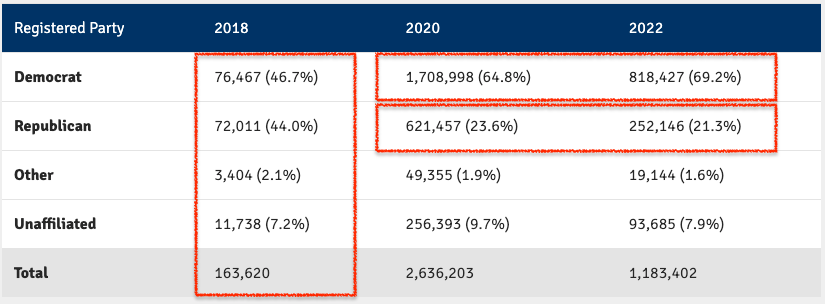Covid Killed the Red Wave but DeSantis Rides High!
Pandemic policies changed election laws in 17 states. Some of them never rolled it back.
First the good news! (More on this guy later):
Covid strikes again. I was predicting Red Wave from September but this last week I felt very uneasy - I saw a Covid angle and it proved true sadly.
Covid policies from 2020 changed up election laws across 17 states. About 9 of those states never rolled them back. Mail-in ballots, absentee ballots, ballot harvesting, early voting, and more...
Pennsylvania went from 164K total mail-in ballots in 2018 to 2.6 million in 2020 (don’t wanna catch the Rona!). Dems returned ballots at a 2 to 1 pace vs GOP in 2020. This year Dems retained half of those homebody voters. GOP - maybe 40%.
The traditional tactic of the 72 hour GOTV efforts has to move to 72 days in many states. The GOP thought things would go back to normal.
Laxalt losing by 22,000. Mail-in diff: +DEM 26,000
Wisconsin: Johnson squeaking by as the incumbent.
Georgia: Walker down by 35,000. Dem+ 200K on the ballots:
Here’s what I wrote over the weekend:
In 2020, the chaos of Covid fears led to a host of executive orders. State governors wielded their emergency powers with abandon; leading to sweeping changes for elections across the country. From universal mail-in ballots to ad-hoc policy workarounds; from poll-watcher restrictions to reduced hurdles for ballot curing – 2020 changed the way some Americans will vote for the rest of their lives.
All in all, 17 states made significant changes to their voting procedures during the 2020 election and Covid pandemic – like universal mail-in ballots and new same-day registrations. Currently, only 8 states still conduct all elections by mail (California, Colorado, Hawaii, Nevada, Oregon, Utah, Vermont, and Washington).
Take California. Governor Gavin Newsom declared by executive fiat universal mail-in ballots. Every registered voter would receive a ballot via mail. Some Republican legislators took Newsom to court and won – two days before the election. California’s Democrat-dominated legislature would later codify mail-in ballots for the next several elections. This procedure provided fortuitous protections for Governor Newsom who faced a Fall 2021 recall election – an election he might have lost had a visit to a poll location been the norm and not a vote cast from your dining room table.
In Wisconsin, where Republican Senator Ron Johnson currently leads his Democrat challenger, the 2020 election was particularly contentious. In numerous counties, election clerks allowed voters to claim a status of “infinitely confined” so they could receive an absentee ballot. Over 200,000 ballots were cast under this rubric claiming that Covid-19 pandemic measure qualified them for this exception. The court sided with Republicans that this procedure was suspect but refused to throw out the votes. Numerous lawsuits have been filed to loosen up the requirements for Wisconsin votes since that time but the waters are still muddied and ripe for more legal challenges.
The 2020 Senate vote recounts in Georgia were the center of the political universe well into the new year. Mail-in ballots came in at a volume 5-times that of previous years. The odd thing was the rejection rate. In 2016, 6.4% of all mail-in and absentee ballots were rejected for various reasons. In 2020, that number dropped by more than a factor – only 0.4% of mail-in ballots were rejected, raising many eyebrows. Governor Kemp and Republican legislators passed a host of election changes requiring ID, allowing for early voting, but limiting the universal mail-in ballot craziness of 2020. We expect things will be cleaner this time around for the gubernatorial races and the important Walker vs. Warnock senate race.
In Pennsylvania, the 2020 election gave witness to a range of election shenanigans. From missing USB drives to lax chain of custody laws; from mail-in ballot handling to post-dated ballots counted ad hoc; Pennsylvania was counting and recounting into January. Much of this was heralded in by executive orders from Covid emergency powers. Many of these orders are still on the books. If the balance of power in the Senate hangs on the Keystone State fight between Dr. Oz and John Fetterman – it’s going to be quite the ride.








